>> Sawney Bean
Bible John <<
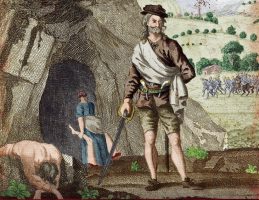
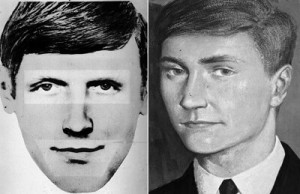
Scotia Extremis celebrates the famous, but also on occasions the infamous. So it is with this week – two of Scotland’s most notorious and murderous individuals, one of whom is shrouded in myth and blurred by history, the other a more recent individual whose identity still remains unclear despite many attempts to unmask him. Sawney Bean, according to some sources, lived in the 16th century, though even this is disputed. He was said to be the head of a family located on the Ayrshire coast around Girvan, and various accounts of his murderous life attribute up to a thousand deaths to his name and that of his clan. What made his story more gruesome were the claims that the murders were followed by cannibalistic practices, details of which Scotia Extremis spares its delicate readers. Bean and his kin were reputedly captured and executed, but legend has preserved his name and his doings throughout the intervening centuries. Bible John was the name given to a serial killer who it is thought murdered three women after meeting them at the Barrowland Ballroom in Glasgow in 1968-69. Witnesses who claim to have spoken to the suspected murderer at the time observed that he talked of religious issues and quoted passages of scripture, which led the Evening Times to begin referring to him as ‘Bible John’. Although several names have become suspects, the identity of Bible John has never been confirmed, and the cases remain unsolved. Although separated by centuries, our two murderers have passed from reality into myth, and have become Scottish folk devils of the blackest kind.
Mastercriminal
by W.N. Herbert
The Denfiends and thi clan o Bean
baith hud ae ugsome mission:
tae eat aa Scotia, fat or lean,
in a cook-aff competition.
Thi Denfiends bideit beh Monikie,
thi Beans beh Ballantrae:
wan liked tae sup oan fowk-a-leekie,
wan munched man fricassee.
Thir contest wiz baith comprehensive
and, cuisine-wise, a stretch –
thi ingredients, tho inexpensive,
cuid be a pain tae fetch.
Thi thrie estates, fae nyaff tae laird,
wi ilka ane ae dish,
thrie different weys maun be prepared
(thi clergy coonts as fish.)
Thi Beans began wi Broth MacBeth
a sort of cullage skink
but steeped in bluid and biled tae death –
thi newt ehz clogged thir sink.
Thi Denfiends trehd John Knoxtail soup
but thi keest wiz unca werish:
dreh Calvin croutons, brimstane gloop –
yir parish, parched, wid perish.
The Beans cooked Connery confit
in a nesht o shumwan’sh hair,
anna terrine wha’s sheen wiz medd complete
beh thi een o Logie Baird.
The Denfiends favoured finger food –
we presume Dyte Livingstone’s;
thir Slessor sliders luked dead good;
Brude’s bridies, overdone.
Ane barbecued Rabbie wi Fergusson fritters
inna greasy bardic freh;
thi tither geed ye literary skitters
wi Sir Walter Scottage peh.
Ane served a Parcel o Rogues ragout
wi a dhansak o Dundas;
thi tither’s chilli con Darnley blew
thi madrigals oot yir arse.
Thi ashets struck thi board as fast
as Crocketts cuid be spatched,
as Grassic Gibbon’s giblets hashed,
or Naomi’s limbs detached:
Chic Murray Kiev inna bunnet because
his entrance shidna be cauld;
braised Nesbitt brains in Rab C sauce
laid oan a heidband’s fauld;
Scotch eggs de Mary Queen o Scots,
in a lochan o hur gravy;
fresh Para Handy hough in pots;
a Hume-elette o Davie;
wee Lulu in a goulash – aw!
Mock Chop MaGreegor – service!
Sir Alex haggised in a baw –
but noo baith teams luked nervous…
Thi Denfiends hud few pastry skills,
and Sawney feart desserts –
besides, they werr rinnin short on kills,
while Scotland grew alert…
Thir John Broon broonies’d scunner Vic,
lyk thir sponge wi Gilfillan fillin;
while thir Reverend Thomas Spottit Dick
wad find few puntirs willin.
While thi hooves o thi militia scuffed
thir wey tae Desperate Den,
King Duncan doughnuts n Plum McDuff
wiz scoffed beh cannibal men.
And while, thir flintlocks cocked, they moshed
at thi entrance tae thon antre,
a battered Macintosh wiz noshed
wi anthropophagic banter.
Thi order geean, whit they were seean
wad stow a stervin soo,
fur boady pairts, in ilka airt,
werr prinklin inna stew;
werr prinklin, sizzlin, steamin – cooked,
or in man-marinades:
thi wabbit sodgers luked n puked
and fired aff enfilades.
They shucked thi Beans wi baignets fixed,
wi cordite choked thi cave;
thi Denfiends wi thir dennir mixed,
an but wan bairn wiz saved.
O hur latter life ye micht huv heard:
she entered politics,
whaur, haund tae myth, they eat oor words
till truth itsel is sick.
But whit thi people, unappalled,
wad ken, fur Scotland’s sake,
is wha’s oor Maister Cannibal –
results, eftir this break…
“A little to the west of the farmhouse of Denfind, formerly Dunfind, there is a deep ravine called Denfiend, through which a rivulet runs… In Lindsay of Pitscottie’s History… it is called the Fiend’s Den, because a brigand with his family dwelt in it. ‘He had an execrable fashion to all young men and children that he could steal or obtain by other means, and take them home and eat them… For these acts he was burned with his wife, bairns, and family, except a young lass of one year old, who was saved and taken to Dundee, where she was brought up, but when she came to women’s years, she was condemned and burned quick for the same crime her father and mother were convicted of. A great crowd, chiefly women, attended at the execution, cursing her for her crimes. To them she said -‘Why chide ye me as if I had committed a crime. Give me credit, if ye had the experience of eating human flesh you would think it so delicious that you would never forbear it again.'”
Bible Joanne
by Tracey Herd
I Joanne
Her parents were strict. She left school at 14.
She gave them half her wages. Her clothes
were cheap: bargain nylons, dowdy headscarves.
She was only allowed out at weekends
and had to be home by midnight. Her mother insisted.
She met a strange, wee man she could construct
a stage and theatre from, for all the drama
she intended. An occasional prompt but otherwise silence.
You’ll be wanting children soon. You’ll be wanting children soon.
She hated his mother and four sisters as she hated her own.
Her anger grew as the baby grew inside her. Instinctively,
she knew it was a girl and it was draining her blood.
She could still smell a menstruating woman, sick as she felt.
Thou shalt cast them away as a menstruous cloth (Isaiah 30:22)
Such a plan! Should it be The Majestic or The Barrowlands?
No matter. Their handbags all held the accoutrements
of a whore – stringent perfume, red, blue, black pigments, coins.
II Feb 1996 – Sept 2010
Strange to think that Glasgow is the Gaelic word for green hollow.
Now it was packed with sturdy building blocks of industry, universities,
looming but beautiful buildings, dens of iniquity…
On a brilliant, raw morning thirty or so years later, an exhumation.
Across from the watchers… a polythene tent, crusted in ice
stands at the edge of the graveyard at the top of the hill
above Stonehouse, and from it the sounds howl…
a pneumatic drill gouging at the frozen earth… this bloodless gash.
The bones are of little use however and the poor corpse may be blameless.
The original D.N.A found on the girl is too degraded, as blurry
as the ghostly picture of a neo-natal scan, breath rasping in the bitter air.
Once again, he has “disappeared”. A woman, in her fifties,
thin-lipped, eyes alert, stands at a distance, quite invisible.
In September 2010, the last living witness, her claim to unwanted fame,
to the man known as “Bible John”, “lucky” Jean McLachlan
who shared a taxi halfway home with her sister Helen Puttock
left this world of sinners. She had been brought in at least
250 times to view suspects. She hadn’t spoken to her ex
brother-in-law since 1969. It was a relief to die and leave
the dance-hall of horrors, the drunken, exuberant, red, gold,
orange lights, star shapes and faces shooting off into the night.
In daylight, they were grim, twisted wire hieroglyphs of steel,
leeched of colour. Workers walked past the grubby edifice,
a woman without her bright garments, make-up and curls.
lights so bright must, by definition, cast shadows.
Oh Jeanie, which is Hell and which is Heaven?
III 22nd Feb 1968 – 31st October 1969
It was a pleasant conversation. Her name was Patricia,
her husband was in the army, down South. She admired her
orange, crocheted dress. Facially, they were mirror images.
She was a nursing auxiliary. Her period cramps were “terrible”.
She was found two days later in a lane near her home
by a cabinet maker, a creator who stumbled on destruction.
She was naked, raped, and strangled with her own nylons.
he has made naked her fountain and she has uncovered
the fountain of her blood. (Leviticus 20:18)
Her handbag, emptied out, was discarded, its open mouth
that soil and weeds and stones would cram full if left.
Three children and unmarried. She bit down hard enough
on her lip to draw blood. Slut. She had one child now, a girl.
She barely caught her name: “I’m Jemima McDonald”.
She was 5ft 7” with dyed brown hair. She disgusted her.
She’d left home with her curlers in her hair under a red scarf
and come straight to the toilets to make herself a whore.
Her scarf lay pooled on the grubby space by the sink.
Soon enough she would be stretched out on metal
being cleansed off all sin before being cut open.
She had just begun to menstruate. Joanne had towels
in her bag. “oh thank you. You’re a lifesaver. I didn’t
expect it so soon.” She watched her carefully and coveted
with all her being the black pinafore dress, white ruffled
blouse, the off-white sling back shoes. This time, however
he messed up, leaving her fully clothed. He was too frenzied,
raping her then strangling her with her own nylons. Again. Again.
She sulked for weeks about the pinafore dress. He swore
he’d make it up to her. She thought of the grubby children
exploring the empty tenement telling wild stories about a body.
Helen Puttock always made her giggle. The false Indentikit,
her sister’s drunken remembrance of the taxi ride.
A tall man! Red-haired. He was so small and mousey. She knew
he was soft spoken though as he’d repeated the nonsense
she’d scripted for him. Let her suffer, forever guilty,
leaving her sister alone with a strange man.
We are all as an unclean thing, and all our righteousness
are as a filthy rag. (Isaiah 64:6). This time he left a bite mark.
She was found in a little lane, strangled with her nylons, raped and beaten.
The story was beginning to get a little tired. After all, she had a child.
The police were everywhere but she knew she was untouchable.
Let them search and pick up every piece of trash, her discarded
bag, the contents gone with her life, a barely discernible rustle and sigh.
IV Joanne
Sometimes, she sunbathes in her tights in the small back garden,
the sunlight staining her face. He watches from the kitchen window
with fear and desire. She has two children now. Sometimes, by mistake,
she calls me Patricia, the first one, her first born.
Biographies

Bill Herbert is mostly published by Bloodaxe Books. Recent volumes include Omnesia and, with Donut Press, Murder Bear (both 2013). He is Professor of Poetry and Creative Writing at Newcastle University, and Dundee’s Makar, or City Laureate. In 2014 he won a Cholmondeley Award, and in 2015 was made a Fellow of the Royal Literary Society.
 Tracey Herd was born in Scotland in 1968 and lives in Dundee. She studied at Dundee University, where she was Creative Writing Fellow in 1998-2001. She has published three collections with Bloodaxe: No Hiding Place (1996), which was shortlisted for the Forward Prize for Best First Collection; Dead Redhead (2001), a Poetry Book Society Recommendation; and Not in This World (2015), a Poetry Book Society Choice shortlisted for the T.S. Eliot Prize.
Tracey Herd was born in Scotland in 1968 and lives in Dundee. She studied at Dundee University, where she was Creative Writing Fellow in 1998-2001. She has published three collections with Bloodaxe: No Hiding Place (1996), which was shortlisted for the Forward Prize for Best First Collection; Dead Redhead (2001), a Poetry Book Society Recommendation; and Not in This World (2015), a Poetry Book Society Choice shortlisted for the T.S. Eliot Prize.
Images courtesy of;






 Rachel McCrum is a poet and performer who has worked in Scotland, Montreal, Haiti, South Africa, Greece and Northern Ireland. She won the Callum MacDonald Award for her first pamphlet The Glassblower Dances in 2012; was the first ever BBC Scotland Poet In Residence in 2015 and has been awarded a Robert Louis Stevenson Fellowship in 2016. She was a founding member of Stewed Rhubarb Press and the SHIFT/ Poetry Collective; was the Broad of Rally and Broad (The List Hot 100 #12 in 2015) and currently manages the cinepoems project with Glasgow poet Calum Rodger and Montreal poet Jonathan Lamy. She is working on her first collection, due out with Freight in 2017.
Rachel McCrum is a poet and performer who has worked in Scotland, Montreal, Haiti, South Africa, Greece and Northern Ireland. She won the Callum MacDonald Award for her first pamphlet The Glassblower Dances in 2012; was the first ever BBC Scotland Poet In Residence in 2015 and has been awarded a Robert Louis Stevenson Fellowship in 2016. She was a founding member of Stewed Rhubarb Press and the SHIFT/ Poetry Collective; was the Broad of Rally and Broad (The List Hot 100 #12 in 2015) and currently manages the cinepoems project with Glasgow poet Calum Rodger and Montreal poet Jonathan Lamy. She is working on her first collection, due out with Freight in 2017.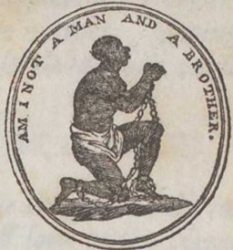
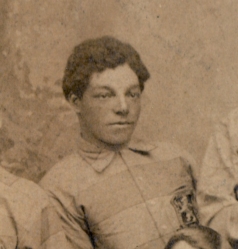
 Alan Riach is the Professor of Scottish Literature at Glasgow University, Convener of the Saltire Society and past-President of the Association for Scottish Literary Studies, 2006-10. Born in Airdrie, Lanarkshire, Scotland, in 1957, he is the author of several books on the poetry of Hugh MacDiarmid and also writes extensively on poetry, arts and culture in contemporary Scotland. His fifth book of poems, Homecoming (2009), follows Clearances (2001), First & Last Songs (1995), An Open Return (1991) and This Folding Map (1990). Formerly Associate Professor at the University of Waikato, New Zealand, he has been working in Scotland since 2001.
Alan Riach is the Professor of Scottish Literature at Glasgow University, Convener of the Saltire Society and past-President of the Association for Scottish Literary Studies, 2006-10. Born in Airdrie, Lanarkshire, Scotland, in 1957, he is the author of several books on the poetry of Hugh MacDiarmid and also writes extensively on poetry, arts and culture in contemporary Scotland. His fifth book of poems, Homecoming (2009), follows Clearances (2001), First & Last Songs (1995), An Open Return (1991) and This Folding Map (1990). Formerly Associate Professor at the University of Waikato, New Zealand, he has been working in Scotland since 2001. Jim Mackintosh is a Perth-based poet. He is author of five collections of poetry, the latest of which is The Rubicon of Ash (CreateSpace, 2016). He is editor of Mind The Time, an anthology of poetry for the Football Memories project which supports the work of Alzheimer Scotland, and which is due to be published in Summer 2017. He is Poet-in-Residence for St Johnstone FC.
Jim Mackintosh is a Perth-based poet. He is author of five collections of poetry, the latest of which is The Rubicon of Ash (CreateSpace, 2016). He is editor of Mind The Time, an anthology of poetry for the Football Memories project which supports the work of Alzheimer Scotland, and which is due to be published in Summer 2017. He is Poet-in-Residence for St Johnstone FC.
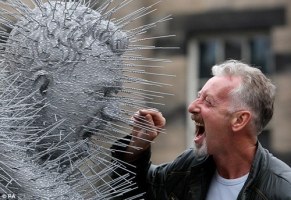

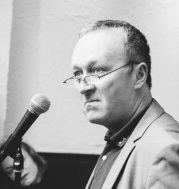 Robin Cairns has written and performed in theatre, poetry, comedy and print, including The King’s Head Theatre (Islington), The Utrecht Poetry Festival, The Stand (Glasgow) and the Saughton Prison In-House Magazine. This year he plans to appear as Morningside Malcolm in The Good, The Bad And The Weegie at The Outhouse, Broughton Street, for the duration of The Fringe. He will also be performing his play, Sawney Bean, A Very Scottish Cannibal at various theatres. He is currently writing another script on the life of Charles Rennie Mackintosh.
Robin Cairns has written and performed in theatre, poetry, comedy and print, including The King’s Head Theatre (Islington), The Utrecht Poetry Festival, The Stand (Glasgow) and the Saughton Prison In-House Magazine. This year he plans to appear as Morningside Malcolm in The Good, The Bad And The Weegie at The Outhouse, Broughton Street, for the duration of The Fringe. He will also be performing his play, Sawney Bean, A Very Scottish Cannibal at various theatres. He is currently writing another script on the life of Charles Rennie Mackintosh.


 Tracey Herd was born in Scotland in 1968 and lives in Dundee. She studied at Dundee University, where she was Creative Writing Fellow in 1998-2001. She has published three collections with Bloodaxe: No Hiding Place (1996), which was shortlisted for the Forward Prize for Best First Collection; Dead Redhead (2001), a Poetry Book Society Recommendation; and Not in This World (2015), a Poetry Book Society Choice shortlisted for the T.S. Eliot Prize.
Tracey Herd was born in Scotland in 1968 and lives in Dundee. She studied at Dundee University, where she was Creative Writing Fellow in 1998-2001. She has published three collections with Bloodaxe: No Hiding Place (1996), which was shortlisted for the Forward Prize for Best First Collection; Dead Redhead (2001), a Poetry Book Society Recommendation; and Not in This World (2015), a Poetry Book Society Choice shortlisted for the T.S. Eliot Prize.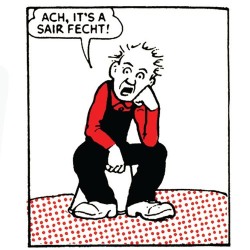
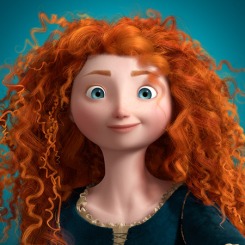


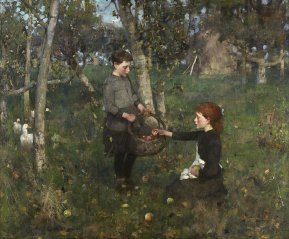
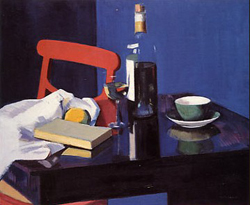

 Douglas Dunn is a major Scottish poet, editor and critic. Author of over ten collections of poetry, he has also edited several anthologies, including The Faber Book of Twentieth-Century Scottish Poetry (2000). He was Professor in the School of English at the University of St Andrews from 1991. Douglas Dunn was awarded the Queen’s Gold Medal for Poetry in 2013 and an OBE in 2003.
Douglas Dunn is a major Scottish poet, editor and critic. Author of over ten collections of poetry, he has also edited several anthologies, including The Faber Book of Twentieth-Century Scottish Poetry (2000). He was Professor in the School of English at the University of St Andrews from 1991. Douglas Dunn was awarded the Queen’s Gold Medal for Poetry in 2013 and an OBE in 2003.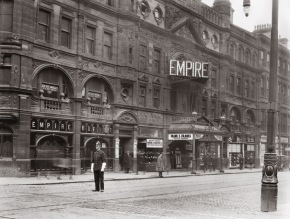

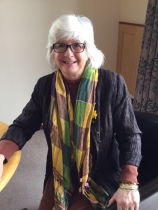

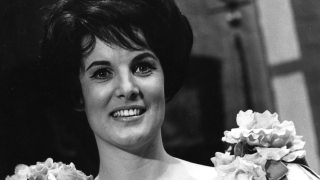






 Charlie Gracie’s first poetry collection, Good Morning, was published by diehard in September 2010. His work (poetry and short fiction) has been published in a number of journals and anthologies in Scotland. Alongside this, his poetry has featured in The Herald and the Irish surfing magazine Tontta. He is currently working on a second poetry collection.
Charlie Gracie’s first poetry collection, Good Morning, was published by diehard in September 2010. His work (poetry and short fiction) has been published in a number of journals and anthologies in Scotland. Alongside this, his poetry has featured in The Herald and the Irish surfing magazine Tontta. He is currently working on a second poetry collection.